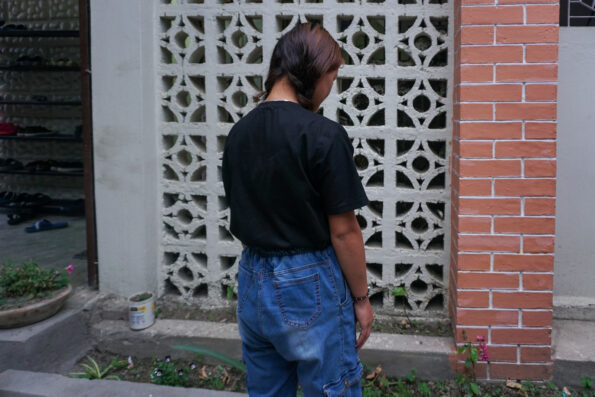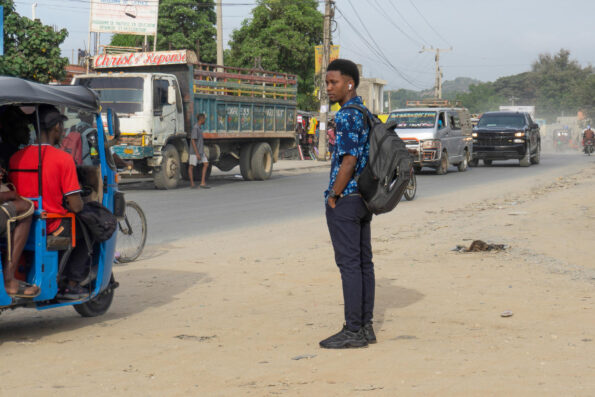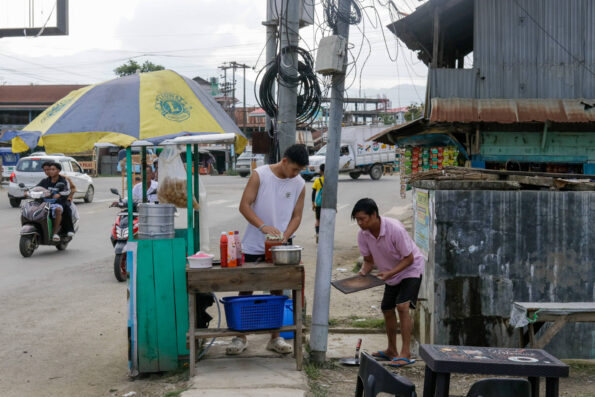
Linda Mujuru, GPJ Zimbabwe
Malvern Kumundati looks for firewood at the Harare residence he and his family moved into after their former landlord made them leave, fearing Kumundati might have the coronavirus. A residents' advocacy group says the pandemic has led to more forced evictions of migrants.
HARARE, ZIMBABWE — Holed up in a hotel-turned-quarantine center in a town on the Zimbabwe-South African border, Sarudzai felt hopeless and alone.
The homemaker had just returned in June from South Africa, where her husband works as a vehicle mechanic. Sarudzai, 40, usually spends half her time there, but when the coronavirus crisis erupted, she came home to be with her three children.
In quarantine, Sarudzai says, nurses banged on occupants’ doors with sticks, shouted at them and told them they had a deadly, contagious virus.
“I understand that the disease is scary, but we were treated as if we were not human beings,” says Sarudzai, who asked not to be fully identified for fear of further stigmatization.
She tested negative for the virus, but when she got home, she says, neighbors gossiped and sniped. Some wouldn’t share water from their wells.
Sarudzai’s story is common among migrants who have returned to Zimbabwe during the coronavirus crisis. They say they face nervous families, suspicious neighbors and landlords who don’t want to rent to them. Having come home, they find themselves treated as outcasts.



For many years, Zimbabwe’s political and economic instability — including hyperinflation, currency fluctuations, labor disputes, lack of formal jobs and other crises — has compelled migrants to seek a better life elsewhere, particularly in neighboring South Africa.
No one knows how many Zimbabweans live and work outside the country. But by the early 2000s, tens of thousands had moved to the United Kingdom, according to the Journal of Injury and Violence Research, a medical journal published in Iran. As far back as 2011, it noted that an estimated 3.4 million Zimbabweans had left the country, making it “one of the largest contributors of immigrants in Southern Africa.”
When the pandemic struck, rattling the global economy, many Zimbabwean migrants found themselves out of work. Some came home voluntarily, but others were deported from places such as Botswana and South Africa, which has the continent’s highest number of cases of COVID-19, the disease caused by the coronavirus.
Fadzai Nyamande-Pangeti, a communications officer with the United Nations’ International Organization for Migration, says Zimbabwe’s crippled economy and ravaged health sector have combined to heighten the ordeal of returning migrants.
As a diabetic, Clara Moyo, a Harare resident who rents out rooms in her house, does not want to test Zimbabwe’s health care facilities. People with preexisting conditions are especially vulnerable to COVID-19.
“I can’t risk exposing myself to people who might have the virus, especially those who have traveled from countries with a high [number of] cases,” says Moyo, 59. “Even a tenant who leaves the house frequently I don’t accept because it’s a huge risk for me.”

The Pandemic's Global Impact
Global Press Journal reporters explore implications of the coronavirus.
Click to read more articlesPrecious Shumba, director of the Harare Residents’ Trust, which focuses on issues related to local governance and housing, says his organization receives reports from people worried about neighbors who may have the coronavirus.
Shumba says no landlord should use the pandemic as an excuse to discriminate.
“Any lodger or person whose rights were deprived as a result of COVID-19 has a right to seek legal recourse, provided they have the evidence,” he says. “In the case of a lodger, no property owner has a right to chase anyone away without a written notification of three months.”
Malvern Kumundati, 31, left for South Africa because he couldn’t find a job with his degree in library and information science three years after graduating.
He lived in South Africa for three years, working at a restaurant there, but lost his job to the coronavirus crisis.
Upon returning, Kumundati, who is married with a 5-year-old daughter, endured a mandatory eight-day quarantine.
He tested negative and came home, but even his family feared him. His wife washed his dishes as soon as he finished eating, and she and their daughter often wore protective masks around him.
His landlord made the family immediately leave the two rooms they rented.
“It hurt when we were told to leave,” says the relaxed, soft-spoken Kumundati. “People think being rejected and stigmatized is normal, but it actually causes depression. The government needs to offer counseling and educational services so that people do not go through this.”
Simon Masanga, permanent secretary in the Ministry of Labour and Social Welfare, says his agency has not recorded any cases of stigma and discrimination in relation to the coronavirus.
“Psychosocial support is being provided to the returnees before, during and prior to discharge from the quarantine centers,” he says.
Dr. Agnes Mahomva, who leads Zimbabwe’s National Response to COVID-19, says the government still has made informing the public a priority, especially via the media.
Mahomva also says the government has urged Zimbabweans to self-isolate, told them how to avoid infection and exhorted them “not to stigmatize other people.”
The stigma for Sarudzai and her children has eased, but she says some neighbors remain hostile.
“I’m optimistic that it will get better with time,” she says.
Meanwhile, Kumundati has found work making bricks, and says he and his family have settled into a new community. He does not tell his neighbors where he spent the past three years.
Linda Mujuru is a Global Press Journal reporter based in Harare, Zimbabwe. She specializes in reporting on agriculture and the economy.
Translation Note
Linda Mujuru, GPJ, translated some interviews from Shona. Click here to learn more about our translation policy.






